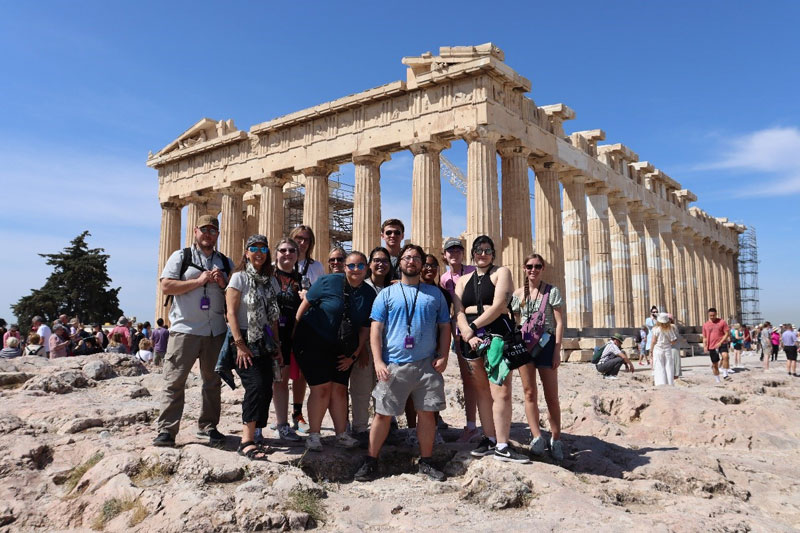
Read time:
Learning about chemistry in a lab is one thing, but going overseas to discover its roots and uses through time is quite another.
Chemistry Senior Lecturer Dmitry Liskin wanted to give students a global view of science, so he decided to take his chemistry show on the road, across the ocean, to the place where so many of the concepts that shape the modern world came to life.
The first-ever chemistry study abroad program took flight this May as a way for Christopher Newport students to not only earn their required science credits, but also to see for themselves the scientific ideas and discoveries they often read about in textbooks. It was built on the CHEM 110 “Chemistry and Society” course, part of the Department of Molecular Biology and Chemistry curriculum that focuses on chemistry and medicine through the ages.
Students traveled to Greece, Czechia, and Germany. In each country, they examined the key scientific contributions and methods that have influenced global science and medicine over the years. For example, students visited the Alchemy Museum in Prague to study the contributions of alchemists to modern science, such as distillation; the BASF chemistry headquarters in Germany; and the Munich Museum of Science and Technology. In addition, in Greece, they toured the Parthenon, the Temple of the God of Medicine, and the Hippocrates Garden Cultural Center on the Isle of Kos.
“There were a lot of aha moments,” said Liskin. “Students were saying, ‘this all of a sudden makes sense now.’”
Students, many of whom were not science majors, saw that “everything in the world is interconnected. We don’t operate in a vacuum,” Liskin said.
The idea of the trip was to provide students with a science journey built upon a foundation of experiential learning.
“I wanted the students to see the world and science through a different lens,” Liskin said.
As part of their assignments, students were asked to journal about their observations and experiences.
Liskin, who is passionate about both science and history, was eager to weave both elements into the trip to give students a unique perspective on the chemistry and medicine that impact their lives.
“I wanted them to get a broader understanding and appreciation of what it takes to make science,” he said.
Study Abroad is one of the four pillars of a Christopher Newport education, along with Undergraduate Research, Internships and Service. In fact, U.S. State Department rankings last year placed CNU’s Study Abroad third among public universities and sixth among all universities, public and private. CNU ranked tenth nationally in total study abroad participation.
According to the report, nationally only 5.9% of undergraduate students studied abroad in 2021-2022. At CNU, nearly 27% of students take advantage of what can be a life-changing opportunity.
Celeste Holliday, ‘24 Biology, was one of the students on the trip. She said it “exceeded my expectations in every way.” One of her main takeaways from it was to “get out of your comfort zone!”
“I learned that I am so much stronger than I thought physically and mentally, and I learned that chemistry is an integral part of society's advancements- dating back all the way to Ancient Greece, and even today,” she said.
Holliday was actually traveling in Greece on the day of Commencement.
“It was pretty cool to say I graduated in Greece surrounded by my friends,” she said.
For Robby Buck, ‘27 Biochemistry, the class powered his pursuit of “a hands-on experience with chemistry based on what I had previously learned.” A favorite part of the trip, he said, was traveling to a volcanic thermal beach on the Island of Kos. His career goal is to bring back recently extinct species to repair ecological damage caused by the Industrial Revolution.
“It was a delightful and wonderful way to see the countryside and find medicinal plants,” he said.
The students earned three science credits through the class.
“It’s a great way to learn about the applications of chemistry and the historical and cultural factors that have shaped chemistry and medicine. It is an engaging form of experiential learning,” said Dr. Diane Catanzaro, an emeritus professor of psychology who co-led the trip with Liskin. “It’s the best of the liberal arts tradition of connecting science, history, religion, art, communications, social sciences and philosophy.”
The chemistry study abroad experience was so successful, Liskin said, that there are plans to take another one in May 2025. Dr. Jeffrey Carney, associate professor of chemistry, will co-lead the trip. They are hopeful that the trip will again draw students from a variety of majors.
“Doing study abroad is wonderful,” Liskin said. “Why not go places where science happened and absorb the energy?”